Search
Search Results
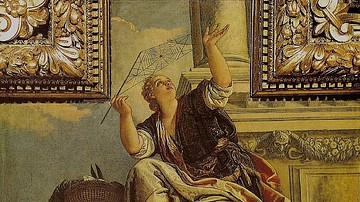
Definition
Arachne
Arachne, from the Greek arákhnē (meaning spider), is a figure in Greek mythology whose talent for weaving was renowned and who famously challenged the goddess Minerva to a weaving competition. As told in Ovid’s (43 BCE-17 CE) Metamorphoses...
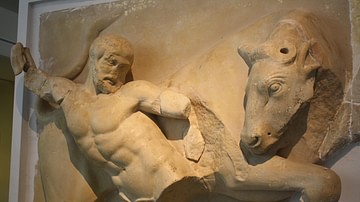
Definition
Hercules
Hercules (Herakles) was a hero of Greek mythology famous for his great strength and endurance. Celebrated as an extraordinary mortal, his success in seemingly impossible labours won him an immortal place amongst the gods. As the greatest...
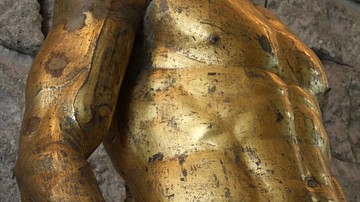
Article
The Life of Hercules in Myth & Legend
Hercules is the Roman name for the Greek hero Herakles, the most popular figure from ancient Greek mythology. Hercules was the son of Zeus, king of the gods, and the mortal woman Alcmene. Zeus, who was always chasing one woman or another...
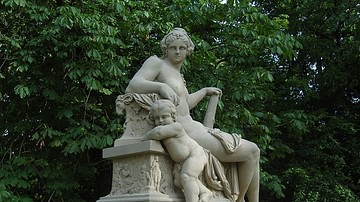
Definition
Megara (Wife of Hercules)
Megara was the first wife of the Greek hero Herakles (better known as Hercules). She was the daughter of King Creon of Thebes who gave her in marriage to Hercules in gratitude for his help in winning back Creon's kingdom from the Minyans...
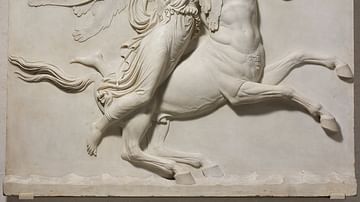
Definition
Deianira
Deianira was the second wife of the Greek hero and demi-god Herakles (better known as Hercules, son of the god Zeus and the mortal woman Alcmene). She was the daughter of King Oeneus and Queen Althaea of Calydon. During the time of Hercules'...
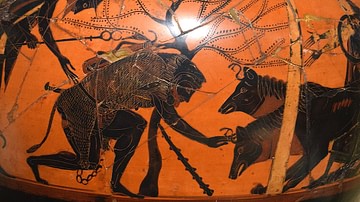
Definition
Cerberus
Cerberus (also spelt Kerberos) is a vicious three-headed dog in Greek mythology, who guards the entrance to the underworld. He allowed the souls of the dead to enter Hades but prevented the living (except for a few exceptions) from entering...
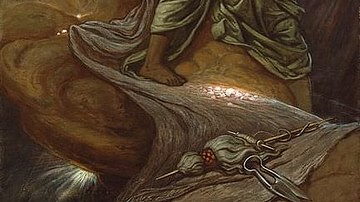
Article
Hercules and Alcestis: Personal Excellence & Social Duty
For the ancient Greeks, the quality of arete (personal excellence) and the concept of eusebia (social duty) were most important. Aristotle discusses both of these at length in his Nichomachean Ethics and relates arete to eudaimonia - translated...
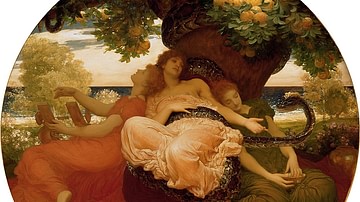
Definition
Hesperides
The Hesperides are nymph-goddesses of the evening and the west in Greek mythology. They were the daughters of Atlas, the Titan who bore the heavens on his shoulders, and Hesperis, the personification of the west, or Nyx, the personification...
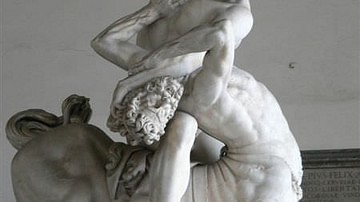
Definition
Centaur
A centaur was a creature from Greek mythology which was half-man and half-horse. The head, arms and torso of a centaur were human and joined at the waist to the body and legs of a horse. Centaurs represented barbarism and unbridled chaos...
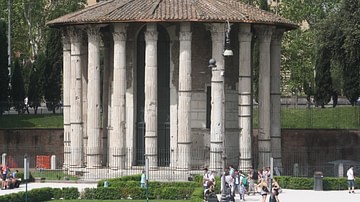
Article
Temple of Vesta/Hercules, Rome
The Temple of Vesta is the popular name given to the round temple near the Tiber River in Rome (now Piazza Bocca della Veritá). The association with Vesta is due to the shape of the building but in fact it is not known to which god...